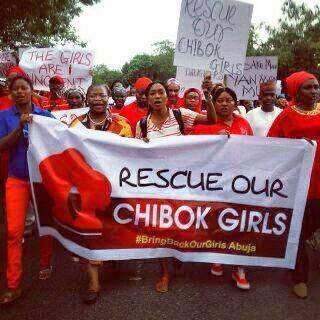 These trending hashtags on Twitter represent the widespread anguish of many Nigerian citizens following the abduction of hundreds of secondary school girls in Chibok, Borno State. Abducted by suspected Boko Haram insurgent fighters since April 14, 2014, the whereabouts of these young girls remain unknown. Latest reports suggest that they may have been ferried across the border and forced to marry the Islamic insurgents. The military search and rescue efforts has made scant progress ever since localized forest searches by local hunters, community volunteers and grieving parents armed with cutlasses, bows and arrows equally failed.
These trending hashtags on Twitter represent the widespread anguish of many Nigerian citizens following the abduction of hundreds of secondary school girls in Chibok, Borno State. Abducted by suspected Boko Haram insurgent fighters since April 14, 2014, the whereabouts of these young girls remain unknown. Latest reports suggest that they may have been ferried across the border and forced to marry the Islamic insurgents. The military search and rescue efforts has made scant progress ever since localized forest searches by local hunters, community volunteers and grieving parents armed with cutlasses, bows and arrows equally failed. The disappearance of the school girls provoked national and international outrage, triggering protests across the country; fiery campaigns and powerful conversations across diverse social media platforms. In Spaces for Change Discussion Forum, no day passes without 10-20 different online postings including moderated discussions generating hundreds and thousands of commentaries on the rising state of insecurity across the country, particularly in the North Eastern part of the country where insurgency has continued to jeopardize the realization of the right to education for young school girls. Majority of the posts interrogate the security infrastructure of the Nigerian state, with primary focus skewed on the prospects of developing appropriate strategic and tactical responses to the disastrous setbacks in the battlefields.
“ThisBoat is Sinking”, an April 22, 2014 article authored by Spaces for Change.S4C’s executive director, Ms. Victoria Ohaeri which went viral on the internet raised important issues surrounding the handling of the search and rescue efforts; asked critical questions regarding the official documentation of the missing school girls and proffered recommendations for stemming the tide of insecurity across the country. She wrote:
“Depending on the sources you have been reading, no less than 200 Nigerian school girls are trapped in some extremely dangerous Boko Haram-controlled forests in Borno State. Eight days after their abduction, the fate of these young girls remains unknown. Serial rape, sexual slavery and killing of abducted young girls are common place…Till this day, there is no accurate data of the number of missing school girls. All the national dailies report fluctuating figures – 234, 230, 188, 79, 100, 270, 280 and what have you, reducing the victims to mere figures instead of human beings desperate to return home to their parents and loved ones.
EIGHT DAYS AFTER, not a single message of concern has been heard from the ministries of education, youth, women affairs and the farcical office of the first lady! The relevant ministries that ought to spearhead the search and lead the campaign for safe return of the school girls have maintained a deafening silence. EIGHT DAYS AFTER, the plethora of federal and state government agencies that corner more than 70% of the annual budget to themselves communicate no known strategy or action plan for gathering accurate data of missing, displaced, wounded and disappeared persons. Without shame or guilt of underperformance on their part, both the state and federal government agencies now totally rely on the foreign media and external NGOs to assist them with routine data-gathering. What a slide!
Beyond the duplication and recycling of press statements with traditional swiftness condemning the violence in strong terms, private sector organizations now need to understand the limits of what the public sector can do to mitigate and respond to security emergencies and terrorist-linked disasters. This means that it is becoming increasingly apparent that the Nigerian military alone cannot meet the continually growing security challenges and now more than ever, needs the support of the private citizens and corporate sector to assist with preparedness, mitigation and response interventions. In this regard, multinational corporations and corporate players can no longer continue to watch from a distance. In other words, corporate social responsibility initiatives must now move away from white-washing old classroom blocks to donating part of their fat security budgets and advanced security infrastructure to national emergencies”.
S4C recognizes that every effort counts; every voice, every tweet, every retweet, every Facebook post and every file shared on this campaign strengthens the filament of collective steps to win a safe future for Nigerian school girls. Our people-powered campaigning will continue to connect concerned voices and link up with other actors working to sustain the campaign until every one of the missing girls are found and reunited with their families.




















